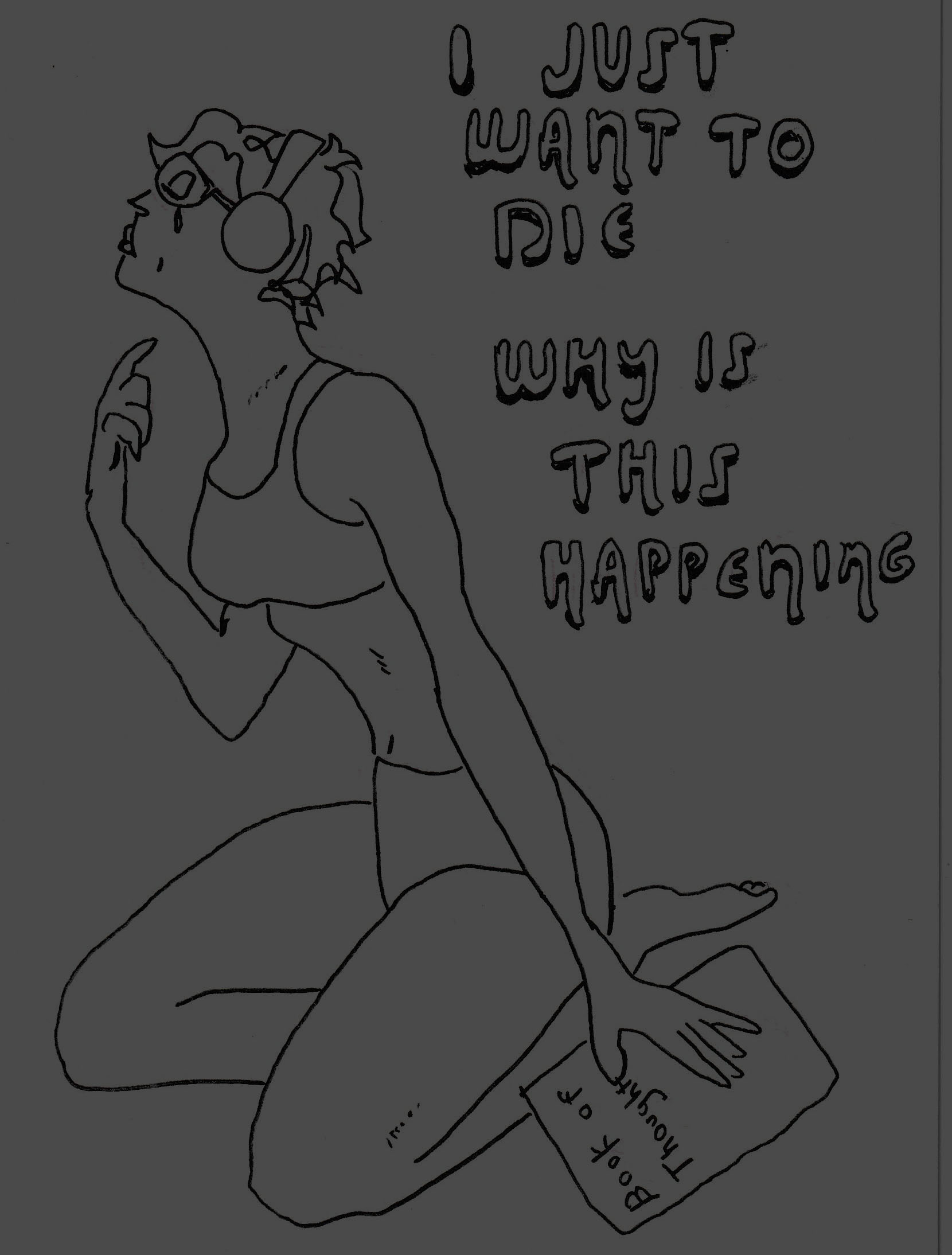This review will be different then my reviews in two ways:
1) I know and talk to Adrianna Rangel. I wouldn’t say we are friends, but she’s not a stranger and she probably knows my problems better than my co-workers.
2) I received an advanced review copy. I did pre-order Book of Thoughts: Volume I, but this is a special advance copy for me to review. I normally don’t review books I don’t buy myself and review in private.
So this might be a little different then how I generally review poetry books. Its also going to be met with a lot more of a soft response then I could give sometimes. Some of this is that even before I’ve read more than 3 pages of the book, I already know that Adrianna has defined the main character and the structure and pacing of the book. I also can’t share any of the poetry, short stories, or artwork from the book. So a lot of this is just gonna have to be you taking my word you guys.
Before reading more than 3 pages of the book I can tell Book of Thoughts Limited Edition: Volume I is about the author’s struggle with having a Borderline Personality Disorder (BPD) that was so bad that she thought she’d never recover. She had to first discover she had BPD and then she would experience all the symptoms that BPD has to offer and she has to overcome them. The fact that I’m messaging her online about her new glasses lets me know she didn’t lose to her BPD, so the book is about overcoming illness. So people with illness should feel comfort from the book, and know that their struggle is shared. If they fight the good fight then they will also become stable, healthy, and overcome their illness. They may always have their struggle but they won’t be a victim of their illness. I’ve written all this with just reading the first few pages so I could be wrong. I just get the deep sense that this is the book.
After reading the whole book twice, and some parts multiple times. First off, I LOVED IT. I actually stopped what I was doing and messaged Adrianna that I loved it. While I think my initial thoughts were correct, it’s a lot more intense than I first thought. Her youth trauma wasn’t vague, it was written out and very clear, even seeming to name the active villain. The other characters that were traumatic (or the potential victims of the author’s trauma) are left largely unnamed.
So, there is something worth talking about Adrianna Rangel’s writing style. In the book, going from topic to topic, it rings very clear what she is doing with her work and her language. She is using simple language with quick patters that stretch out the last vowel that forces you to read it with kind of a poetic drawl. The problem with this style is that while it works as a book, it leaves each individual poem on its own as worse. It’s going for the 16 year old sad girl aesthetic you’d see on Facebook like “You laugh because I’m different I laugh because you are all the same” when isolated away from the larger more impactful parts. This will greatly hurt its social share-ability. I can’t see giving someone a page and then they saying “yes this is for me!”. It’s either too forcefully traumatic or too poetic young sad girl. They need each other for the book but it is hard to share.
If there was one writing change I would take out that seems to run through the book, its this energy or word choice like “I will always win in the end”. I think it’s going for empowering vibes, but it kind of comes off with a current day “don’t fuck with me I will wreck you”.
The book has a lot of references in it I don’t understand. They seem more like an ARG than something I can comb through the book and understand. I can’t talk about any of them too much here, as the book isn’t released yet. On page 111 there is color in the book. Upside down song titles. Its a book that you can spend some time dissecting to find what the author is referencing. The book itself is incredibly combed over by the author and it has a perfectionist feeling.
The author’s recovery phase comes in a little suddenly, with them finding a diagnosis and with tools to help them with their issues, and then are able to have stable relationships.
Ultimately, it comes with an inspirational sting. I liked the book a lot. It makes me feel emotions toward the author, but it also gives you ideas that you can grow. It’s inside poetry norms of needing to be open book therapy, but doing it in a nice clinical way that a therapist could read it and see recommending it to others. It’s definitely a poet’s book. Its a book that could inspire other women to become poet’s and to be able to recognize and emulate this style to get started.
Who are the main characters of the poetry book?
Adrianna Rangel, who acts as the character you project onto. The character experienced trauma growing up with hints at drugs and death. The fourth poem is very vague, but clearly is about forced violent statutory rape. The book gets a lot more raw a lot faster than I would have first thought. From there its mostly about the author, with various people coming and going from the poems of the book. You can tell that the author also wants these people to read it. I bet when they do it will make them cry.
What are the going themes, patterns, and large ideas?
The going theme is trauma. Until half way through the book it is about the trauma that the author experienced or would cause others. Half way through the book she lists her symptoms that align with their BPD. Even going through therapy, the author experiences trauma. The author’s writing style almost needs the trauma even when they are overcoming it as it suits the writing style. Once the author starts to heal, there is a going theme of “thoughts” and “thinking”. This makes sense, as it is a book of thoughts. There is also a theme of drugs through the book- unlike most things that the author works through this seems to linger in the background
Is this a story that is structured in order?
Yes, it starts with the main character young, rising, spiraling down, having an all is lost moment, and then overcoming their fall.
What are the goals of the book, and did it succeed?
Borderline Personality Disorder (BPD) is something the character struggled with their whole life, and they didn’t know they had it or how to overcome it for most of it. I believe you are supposed to project onto the character as someone who also suffers from an illness that they didn’t understand, and come out overpowering it and getting control. There is a side outcome that can occur that I don’t think is the goal- you sympathize with the character and you want to care about them.
Does it match your preferences?
I would say, largely yes, but for the wrong reason. This is an empowering book meant for people who are struggling and help people who might have BPD have access to tools that will help them. This isn’t the preference I like. I like the sad soft girl protagonist character and writing style. It lends itself to her being a character that I enjoy a lot as a character in fiction. I think I could read stories of her trauma and struggle drama forever. Her recovery tends to be less thrilling. So it does match my preferences for a protagonist, but some of the theming could be better for my tastes. That said, I’m not the target audience for the book.
This is also a poet’s book so people who read a ton of poetry books will champion this.
Who would you recommend this book to?
I have this problem that I would worry anyone I would like to recommend this book to or give this book to as a gift, that they would look at me sideways telling me something like “Are you trying to hint to me I have mental illness?”. So this is a hard book for me personally to share. People who work in behavioral health I think would enjoy this book a lot. They would also know more appropriate people for this book to be shared with.
Contact Information
Website: www.bookofthoughts.info
Email: AdriannaRangel@bookofthoughts.info
Instagram: _bookof.thoughts
Instagram: ayeelare
Facebook: www.facebook.com/bookofthoughts.byar


